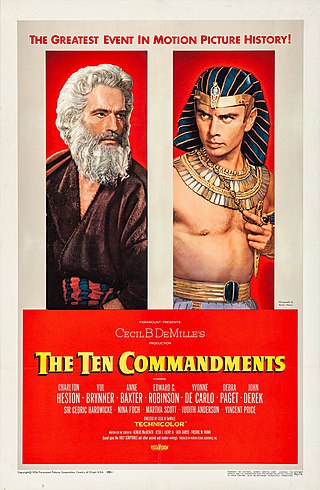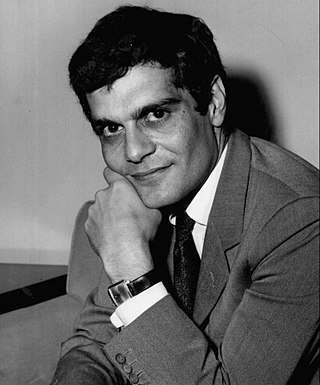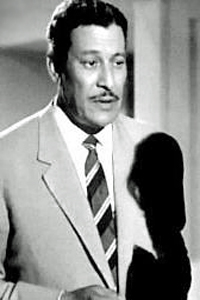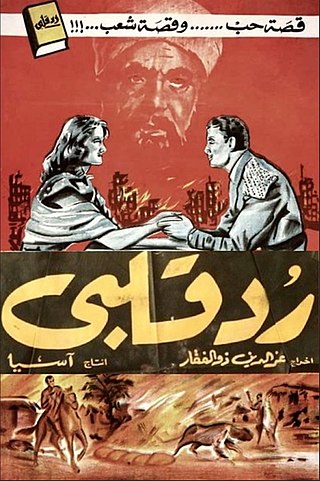
The Ten Commandments is a 1956 American epic religious drama film produced, directed, and narrated by Cecil B. DeMille, shot in VistaVision, and released by Paramount Pictures. The film is based on the 1949 novel Prince of Egypt by Dorothy Clarke Wilson, the 1859 novel Pillar of Fire by J. H. Ingraham, the 1937 novel On Eagle's Wings by A. E. Southon, and the Book of Exodus, found in the Bible. The Ten Commandments dramatizes the biblical story of the life of Moses, an adopted Egyptian prince who becomes the deliverer of his real brethren, the enslaved Hebrews, and thereafter leads the Exodus to Mount Sinai, where he receives, from God, the Ten Commandments. The film stars Charlton Heston in the lead role, Yul Brynner as Rameses, Anne Baxter as Nefretiri, Edward G. Robinson as Dathan, Yvonne De Carlo as Sephora, Debra Paget as Lilia, and John Derek as Joshua; and features Sir Cedric Hardwicke as Seti I, Nina Foch as Bithiah, Martha Scott as Yochabel, Judith Anderson as Memnet, and Vincent Price as Baka, among others.

Omar Sharif was an Egyptian actor, generally regarded as one of his country's greatest male film stars. He began his career in his native country in the 1950s. He is best known for his appearances in American, British, French, and Italian productions. His career encompassed over 100 films spanning 50 years, and brought him many accolades including three Golden Globe Awards and a César Award for Best Actor.

The Prince of Egypt is a 1998 American animated musical drama film produced by DreamWorks Animation and distributed by DreamWorks Pictures. The second feature film from DreamWorks and the first to be traditionally animated, it is an adaptation of the Book of Exodus and follows the life of Moses from being a prince of Egypt to a prophet chosen by God to carry out his ultimate destiny of leading the Hebrews out of Egypt. The film was directed by Brenda Chapman, Steve Hickner, and Simon Wells, and produced by Jeffrey Katzenberg, Penney Finkelman Cox, and Sandra Rabins, from a screenplay written by Philip LaZebnik. It features songs written by Stephen Schwartz and a score composed by Hans Zimmer. The film stars the voices of Val Kilmer, Ralph Fiennes, Michelle Pfeiffer, Sandra Bullock, Jeff Goldblum, Danny Glover, Patrick Stewart, Helen Mirren, Steve Martin, and Martin Short.

The Egypt national football team, nicknamed "Pharaohs", represents Egypt in men's international football, and is governed by the Egyptian Football Association (EFA), the governing body of football in Egypt.

Samia Gamal was an Egyptian belly dancer and film actress.
Gardiner's Sign List is a list of common Egyptian hieroglyphs compiled by Sir Alan Gardiner. It is considered a standard reference in the study of ancient Egyptian hieroglyphs.

Isma'il Yasin was an Egyptian comedy actor. He was known for his slapstick humor and has been compared to Charlie Chaplin. He began his acting career in 1939 with the film Khalaf El-Habayeb.

Middle Eastern cinema collectively refers to the film industries of West Asia and part of North Africa. By definition, it encompasses the film industries of Egypt, Iran, Bahrain, Iraq, Israel, Jordan, Kuwait, Lebanon, Palestine, Oman, Qatar, Saudi Arabia, Syria, United Arab Emirates, and Yemen. As such, the film industries of these countries are also part of the cinema of Asia, or in the case of Egypt, Africa.

Ezz El-Dine Ahmed Mourad Zulficar was an Egyptian film director, screenwriter, actor and producer known for his distinctive style, which blends romance and action. Zulficar is widely regarded one of the most influential filmmakers in Egyptian Cinema's golden age.
The following is a list of Egyptian films. The year order is split by decade. For an alphabetical list of films currently on Wikipedia, see Category:Egyptian films.

The Egyptian film industry is today based mainly in Cairo, which is sometimes referred to as Hollywood on the Nile or Hollywood of the East, despite having its beginnings in the city of Alexandria in the early 20th century. A strong industry grew in Egypt with high distribution among the Arab world, and Cairo produces around three-quarters of the Arab world's screen output. It has had a large effect on the African and Arab film industry since the early 20th century.

Emad Hamdy also known as Imad Hamdi, was an Egyptian actor. He was married to the Egyptian actress Shadia between 1953 and 1956. And between 1962 and 1975 he was married to the Egyptian actress Nadia El Guindy, and they had one son.

Salah El-Din Ahmed Mourad Zulfikar was an Egyptian actor and film producer. He started his career as a police officer in the Egyptian National Police, before becoming an actor in 1956. He is regarded as one of the most influential actors in the history of the Egyptian film industry. Zulfikar had roles in more than a hundred feature films in multiple genres during a 37-year career, mostly as the leading actor. He was one of the most dominant leading men in Egyptian cinema. He worked in theater throughout his career, playing celebrated theatrical roles. Late in his career, he had considerable success in television roles.
Kamal El Sheikh was an Egyptian film director. He directed 28 films between 1952 and 1987, with eight of them in the Top 100 Egyptian films list. He was known in the fifties and early sixties as "Hitchcock of Egypt" because of his influence on the cinema of the well-known British director.
Fatin Abdel Wahab was an Egyptian film director. He directed 52 films between 1949 and 1970. His 1961 film Wife Number 13 was entered into the 12th Berlin International Film Festival. His 1965 film Driven from Paradise was entered into the 4th Moscow International Film Festival.
Ismail Yassine in the Navy is a 1957 Egyptian comedy film directed by Fatin Abdel Wahab.

Return My Heart (Egyptian Arabic: رد قلبى, translit: Rodd Qalbi, is a 1957 Egyptian film directed by Ezz El-Dine Zulficar and written by Yusuf Sibai and Ezz El-Dine Zulficar. It stars Shoukry Sarhan, Mariam Fakhr Eddine, Salah Zulfikar, Hussein Riad and Hind Rostom. The film is listed in the Top 100 Egyptian films of the 20th century.

The 1988 Nobel Prize in Literature was awarded to the Egyptian writer Naguib Mahfouz (1911–2006) "who, through works rich in nuance – now clear-sightedly realistic, now evocatively ambiguous – has formed an Arabian narrative art that applies to all mankind." He is the first and only Arabic–Egyptian recipient of the prize.














